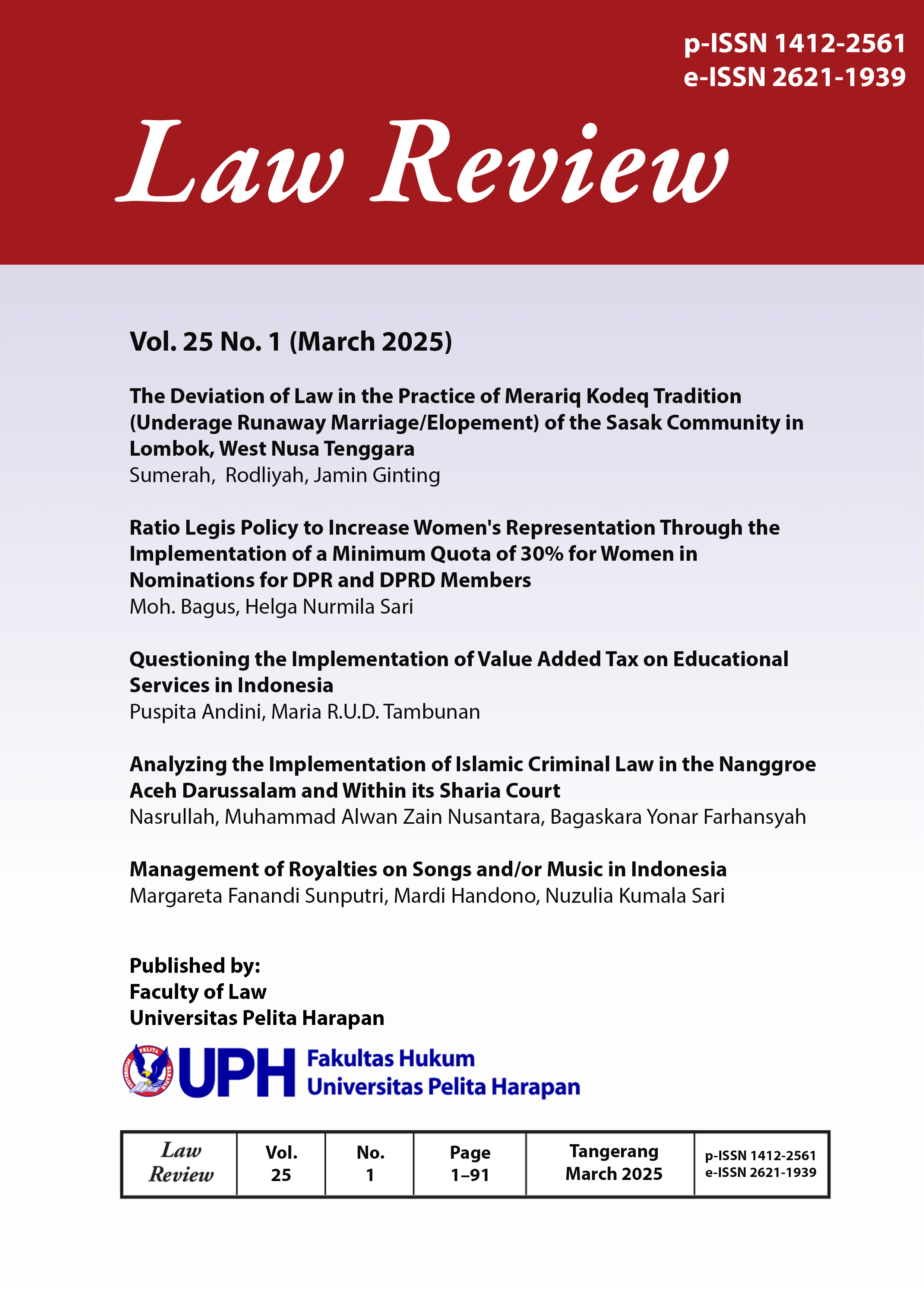Ratio Legis Policy to Increase Women's Representation Through the Implementation of a Minimum Quota of 30% for Women in Nominations for DPR and DPRD Members
DOI:
https://doi.org/10.19166/lr.v25i1.9639Keywords:
Women, Representation, Ratio LegisAbstract
Women as representatives in the strategic political making of decisions. Among the efforts made by the government to increase women's representation was setting a minimum threshold for female candidacy in the legislative and legislative elections. The policy referred to is set forth in Article 245 of Law Number 7 of 2017 concerning Elections. This research uses normative legal research methods with legislative and conceptual approaches. The provision regarding the minimum limit of 30% of women's candidacy is the implementation of constitutional rights, which is regulated in Article 28H Paragraph (2) of the 1945 Indonesian Constitution. The representation of women in the legislature was entrusted as a form of balancing and alignment of patriarchal and dominative elements in strategic policymaking. There are five ratios of an increase in female representation policy, including the existence of women in political decision-making is a counterweight to the patriarchal elements; women's brain variables are wider than men's so as to impact the different responses to an accepted issue; policy correlation with zipper system theory; policy correlation with critical mass theory; and the form of exercise of rights and duties owned by women as right holders and men as duty holders. The increase of female participation in representation can be achieved through political recruitment and the establishment of a political party-wing organization.
References
Laws and Regulations
Republic of Indonesia Law Number 12 of 2003 on Election Members of the People's Representative Council, Regional Representative Council, and Regional People's Representative Council.
Books
Dahlerup, Drude. Electoral Gender Quota Systems and Their Implementation in Europe. Stockholm: Stockholm University, 2008.
EIGE. Gender Equality Index 2019: Sweden. Lithuania: European Institute for Gender Equality, 2019.
Krook, Mona Lena. Quotes for Women in Politics: Gender and Candidate Selection Reform Worldwide. New York: Oxford University Press, 2009.
Panjaitan, Marojahan J. S. Legal Politics: Building a Happy State in the Revolutionary Era of Industry 4.0 and Society 5.0. Bandung: Pustaka Reka Cipta, 2021.
Pitkin, Hanna F. The Concept of Representation. Berkeley: University of California Press, 1967.
Paulsen, Waschke Bockers. Anatomy: Das Lehrbuch. Munich: Elsevier, 2015.
Rahayu, Ruth Indiah. Success and Obstacles of Women’s Representation in Southeast Asia: Between State and Party Policies and Women’s Movements. Jakarta: Partnership, 2014.
Surbakti, Ramlan. Understanding Knowledge Politics. Jakarta: Gramedia Widiasarana, 1992.
Journal Articles
Childs, Sarah, and Mona Lena Krook. “Should Feminists Give Up on Critical Mass? A Contingent Yes.” Politics & Gender 2, no. 4 (2009): 522–530.
Scientific Papers
Schmidt, Gregory D. “Unanticipated Successes: Lessons from Peru's Experiences with Gender Quotas in Majoritarian Closed List and Open List PR Systems.” Paper presented at the International IDEA Workshop, Lima, Peru, February 23-24, 2003.
Court Rulings
Decision of the Constitutional Court Number 22-24/PUU-VI/2008.
Decision of the Constitutional Court Number 20/PUU-XI/2013.
Website Contents
Central Bureau of Statistics. “Women’s Involvement in Parliament (Percentage), 2021–2022.” Central Bureau of Statistics. Accessed July 2, 2023. https://www.bps.go.id/indicator/40/464/1/keterlibatan-perempuan-di-parlemen.html
Commission for Public Relations of the General Election. “2024 National Election DPT: 204.8 Million Voters.” Commission of the General Election. Accessed July 5, 2023. https://www.kpu.go.id/berita/baca/11702/dpt-pemilu-2024-nasional-2048-juta-pemilih#:~:text=Betty%20pun%20melanjutkan%20dengan%20membacakan,%2DIndonesia%20sebanyak%20203,056,748
Moerdijat, Lestari. “Improvement of Women’s Participation in Politics Needs Support from All Parties.” DPR RI. Accessed July 2, 2023. https://www.mpr.go.id/berita/Peningkatan-Partisipasi-Perempuan-dalam-Politik-Butuh-Dukungan-semua-Pihak
Puput, Mutiara. “Government Pushes Efforts to Improve Women’s Representation in Parliament 2024.” Ministry of Coordinating Human Development and Cultural Affairs of the Republic of Indonesia. Accessed July 2, 2023. https://www.kemenkopmk.go.id/pemerintah-dorong-upaya-peningkatan-keterwakilan-perempuan-di-parlemen-2024
Novrizaldi. “Participation of Women in Politics in Indonesia Is Important for National Progress.” Ministry of Coordinating Human Development and Cultural Affairs of the Republic of Indonesia. Accessed July 2, 2023. https://www.kemenkopmk.go.id/partisipasi-politik-perempuan-di-indonesia-penting-bagi-kemajuan-bangsa
Stefanie, Christie. “The Portion of Women in the Legislature Must Be Greater in 2019.” CNN Indonesia. Accessed July 2, 2023. https://www.cnnindonesia.com/nasional/20150827125633-32-74875/porsi-perempuan-di-legislatif-harus-lebih-besar-di-2019
Downloads
Published
How to Cite
Issue
Section
License
Copyright (c) 2025 Moh Bagus, Helga Nurmila Sari

This work is licensed under a Creative Commons Attribution-NonCommercial 4.0 International License.
Authors who publish with this journal agree to the following terms:
1) Authors retain copyright and grant the journal right of first publication with the work simultaneously licensed under a Creative Commons Attribution License (CC-BY-SA 4.0) that allows others to share the work with an acknowledgement of the work's authorship and initial publication in this journal.
2) Authors are able to enter into separate, additional contractual arrangements for the non-exclusive distribution of the journal's published version of the work (e.g., post it to an institutional repository or publish it in a book), with an acknowledgement of its initial publication in this journal.
3) Authors are permitted and encouraged to post their work online (e.g., in institutional repositories or on their website). The final published PDF should be used and bibliographic details that credit the publication in this journal should be included.





